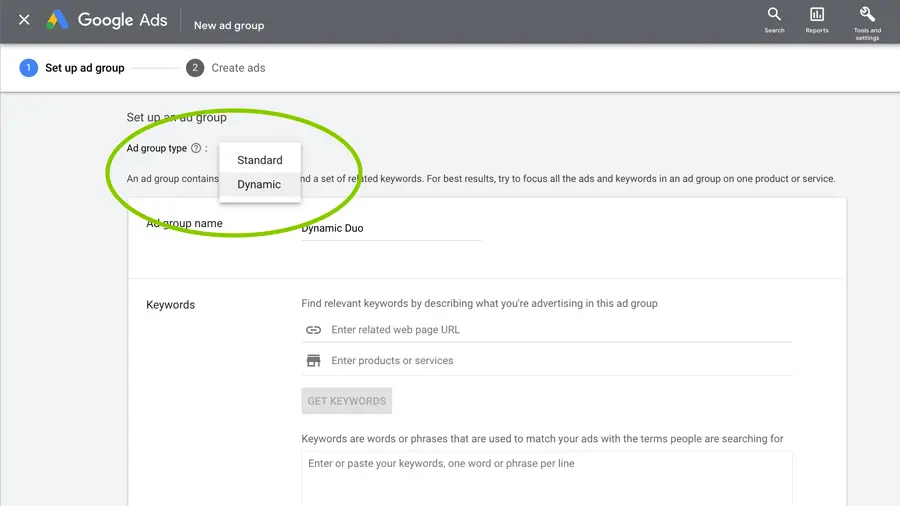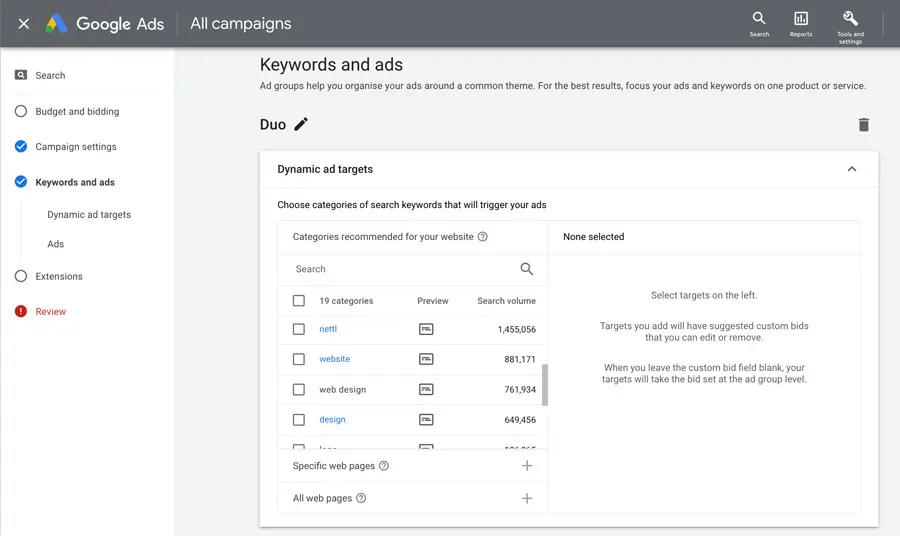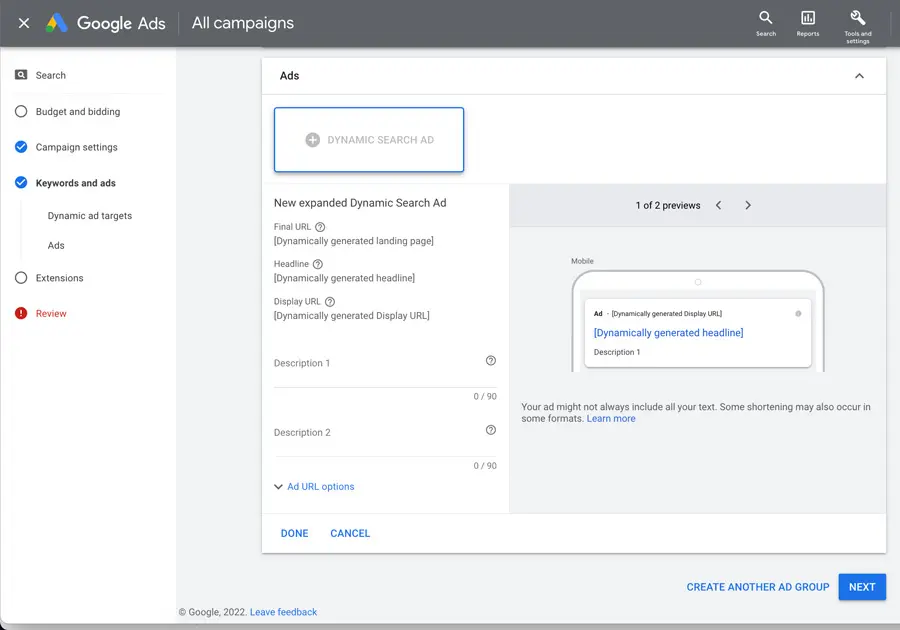Appear for more searches with Dynamic Search Ads
approx 5 minute read
Have you ever searched for something online?
No, not love. A product. Maybe quite a specific product.
Maybe you’ve been shocked at how a detailed model description shows up in the ad headline.
At least, if you’re a marketing person you may be shocked. If you’re more normal, you may not have even noticed.
So how is that done, those magic headline titles?
SURELY they haven’t created individual ads for every product they sell?
Nope.
This dark art is Google’s ‘Dynamic Search Ad’. (DSA)
Magic formula for success?
Not quite.
But it could be mega useful, for sure. If used correctly.
Or catastrophic to your campaign if not.
Let’s take a look at Dynamic Search Ads in more detail.
But first, why use Google ads at all?
Why use Google ads?
Google Ads are a paid-for presence on Google (and on websites Google partners up with).
You can bid for a chance to show up:
- When someone searches for something relevant to your business.
- When someone is browsing a subject relevant to your business.
- Or when that someone matches a demographic relevant to your business.
Does it have to be Google? There are other search engines you know.
True. But Google has the lion’s share.
Combining Google search and the Google Display Network allows you to reach over 90% of internet users across the globe.
That includes Amara. Who is looking for a local dog groomer. Or Aiguo, interested in winter hikes and off-piste adventures.
What are Dynamic Search Ads?
They are a type of Google Search Advert.
They look just like any other Google Advert, so not particularly dynamic.
However, they are automatically (dynamically) created based on your website content.
And instead of being triggered by keywords, these ads appear for searches Google deems relevant to your website content.
Ultimately this can potentially increase your reach without using keywords.
How do Dynamic Search Ads work?
Dynamic Search Ads use your website content to target your ads and can help fill in the gaps of your keyword based campaigns.
You can choose to target specific pages/products, or a group of pages/products.
But I usually bid against keywords. How can I control costs?
You set CPC (cost per click) bids against each target. A target could be a page, product, category or combination of several.
So what’s the main advantage of Dynamic Search Ads?
Fill your gaps. It’s all about showing up for keyword searches that you might not have thought of.
Even well managed ad campaigns with THOUSANDS of keywords can miss relevant searches.
Every day, 16% of searches are ones that Google has never seen before.
So having ads crafted around your content rather than keywords potentially catches more leads.
Because Google will create an ad specifically for that search enquiry, based on your existing content.
This is especially valuable at the sharp end of the search journey (Transactional intent, looking to buy).
So Dynamic Search Ads can help you widen your search net. Catch more niches.
They’re also super simple to set up, as long as your website is well structured.
How do you create Dynamic Search Ads?
It’s really simple. Go to your Google Ads account.
If you haven’t already, set up a campaign with all the settings you wish for a standard Google Ads search campaign.
If you are creating a new ad group, you can adjust this dropdown menu to change the ‘Ad Group Type’ to ‘Dynamic’.
Next, you’ll be asked to select ‘Targets’. This step is important. Because your Targets are used to select the content upon which your ads are based.
You can choose from 3 options
- Categories
Product or service categories that Google has automatically picked out from your website - Specific webpages
Specific pages or a collection of pages from your website. Lots of options to help you include or exclude pages. - Or All webpages.
Every page on your website is fair game.
Once you enter that info, Google will get cracking on your dynamically generated headlines. You’ll need to add a couple of descriptions though. These will need to be kept fairly generic so that they work with anything relevant to your selected target pages.
Saying something about the business or service levels is often a good shout.
“Low prices on all your camping essentials. UK stock. Free delivery & hassle-free returns”
That sort of thing.
Be in more places at once
No two searchers are the same. However, some people click ads before organic listing. Especially if they are shopping for something in particular.
If you have a website page that ranks well organically, you could consider using Dynamic Search Ads to muscle your way into the ad section. Almost effortlessly. Like a bit of organic smuggling. Without the stress.
Getting listed in multiple places on the Search Engine Results page is a holy grail for search visibility.
Ads, Local, Organic, Featured Results. All fair game. Check our post about the allure of the top spot, and other SERP opportunities.
The down-sides of using Dynamic Search Ads
You have less control. Less control over how the ad looks and what it says.
Sure, you can write the description. But unlike the title, the description is generic and used for all the dynamically produced ads with this target.
So it’s harder to achieve that layer of relevance and personalisation.
You need to invest in your website content to ensure it is current, accurate and well structured.
It’s also harder to tweak who sees the ad. And what searches trigger it.
But that’s the point. That’s the payoff. Or else you may as well use standard PPC campaigns.
Fact is, Dynamic Search Ads give you the chance to bring people to your website that you might not have otherwise found.
What PPC strategy should I take?
It depends. But you might be better off using both types of ads.
They are just different tools. Google alone has many.
They can, and often should be used alongside each other.
Just like all marketing channels, digital and real-world.
There’s a lot to think about here. We hope that, after reading this, you’ll consider Dynamic Search Ads as part of your digital marketing strategy.
But your time may be better placed elsewhere.
If so, fetch the pros. We think about this stuff in the shower.











